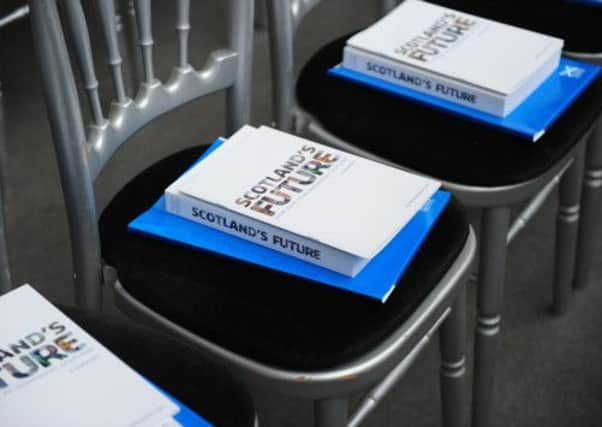White paper: Scottish business reaction


The warning from Scottish Engineering came after First Minister Alex Salmond launched his long-awaited White Paper on independence, which among many details of how the complex separation would be carried out promised to remove the nuclear deterrent from its base on the Clyde within the first parliament.
Bryan Buchan, chief executive of Scottish Engineering, said: “The first obvious concern to the engineering manufacturing sector is the apparent haste with which the first independent parliament would ditch Trident with the consequent loss of employment.
Advertisement
Hide AdAdvertisement
Hide Ad“At current levels this would involve at least 1,600 jobs at Faslane and Coulport. Add to that the large number of secondary jobs within the supporting supply chain and you will create a massive group of highly skilled jobseekers.”
He added: “I would also like to know how the promise of boosting high value jobs through increased manufacturing activity is to be delivered. The manufacturing engineering industry as it exists in Scotland today has demonstrated excellent stewardship to come through a prolonged and deep recession. What is the accelerator that politicians in an independent Scotland think they can activate to improve on this?”
Mr Buchan also expressed concerns that plans to focus on offshore energy could put the manufacturing sector at a competitive disadvantage in an independent Scotland.
However, he said it was “heartening” to see that the document recognises the importance of employer associations such as Scottish Engineering and plans to work with them to address labour market challenges.”
Other business groups struck a more neutral tone on the White Paper.
Andy Willox, Scottish policy convenor for the Federation of Small Businesses’ (FSB), said there was no homogenous business vote.
“The Scottish small business owner will look at this white paper, alongside other materials, as both a citizen and an entrepreneur. She’ll rationally explore the implications for her business while also considering her own political beliefs.”
The director of CBI Scotland, Iain McMillan, has previously posed a detailed set of questions on independence.
Advertisement
Hide AdAdvertisement
Hide AdHe told The Scotsman: “We need to take a closer look at the detail but on first impressions it doesn’t seem to take us that much further forward.”
He also said the CBI believes that the nations of the UK are stronger together and that Scotland’s business and economic interests will be best served by remaining as part of the UK.”
The Law Society of Scotland said it was clear that key questions remained, especially as the Scottish Government had not set out contingency plans if the UK government does not agree to a formal sterling currency union. But it said those questions needed to be answered by both sides of the debate.
Bruce Beveridge, president of the Law Society of Scotland, said: “Given the different positions being taken by the UK and Scottish Governments, it is difficult to understand the most likely currency arrangements if the Scottish people were to vote for independence next year. It is hard to have a proper debate against a background of uncertainty on such an important issue as this.
“Both governments have a responsibility to address that uncertainty.”
The Law Society also renewed its calls for the main political parties which oppose independence to clearly set out the implications of a “no” vote in the referendum next September.
MORE ON THE WHITE PAPER